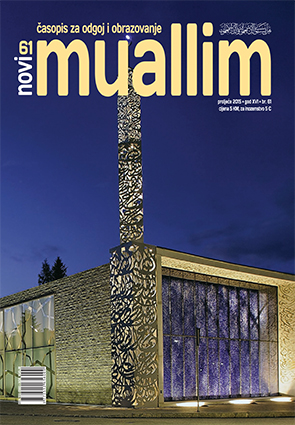RELIGION IN THE PRIMARY LAW OF THE EUROPEAN UNION (II)
The process of creation of legislative formulations in the association agreements of the European Union concerning religion and religious freedom
DOI:
https://doi.org/10.26340/muallim.v16i61.170Keywords:
Primary law, religion, religious freedom, The Treaty of LisbonAbstract
UDK 342.731:061.1EU 2:321.7
The primary law of the EU in the process of creation integrates all the positive elements of humanistic and religious aspects of the society forming the procedure based upon Association Agreements and the system of values defined therein. Inter-nally, within moral-legal norms and religious identity in EU the Treaty of Lisbon officially define both, horizontal and verti-cal values and conflicts arising thereof in issues of religion and religious freedom. These conflicts of values in essence imply a large degree of integration based on common values evolving from toponimos of Jerusalem, Athens and Rome. The Treaty of Lisbon solved many issues of Primary law upon which EU bases its existence as a “supranational organization” , but the issue of its spiritual and religious identity is not yet fully de-fined in formal legislation of EU. To name a single spiritual subject as a bearer of spiritual identity of EU would be in-consistent with presently proclaimed primary legal principles, humanistic commitment and diversity of social environments and religious identities. However if this legislative definition of historical and spiritual identity would incorporate all the spiritual aspects of European society individually, then the Primary law of EU would gain entirely new value.
Downloads
Published
How to Cite
Issue
Section
License
Naknada:
a. Časopis ne naplaćuje naknadu za obradu članaka (APC) i naknadu za podnošenje članaka.
Autori koji objavljuju u ovom časopisu pristaju na sljedeće uvijete:
- Autori zadržavaju autorska prava i pružaju časopisu pravo prvog objavljivanja, pri čemu će rad jednu godinu po objavljivanju biti podložan licenci Creative Commons imenovanje koja omogućuje drugima da dijele rad uz uvijet navođenja autorstva i izvornog objavljivanja u ovom časopisu.
- Autori mogu izraditi zasebne, ugovorne aranžmane za ne-ekskluzivnu distribuciju rada objavljenog u časopisu (npr. postavljanje u institucionalni repozitorij ili objavljivanje u knjizi), uz navođenje da je rad izvorno objavljen u ovom časopisu.


